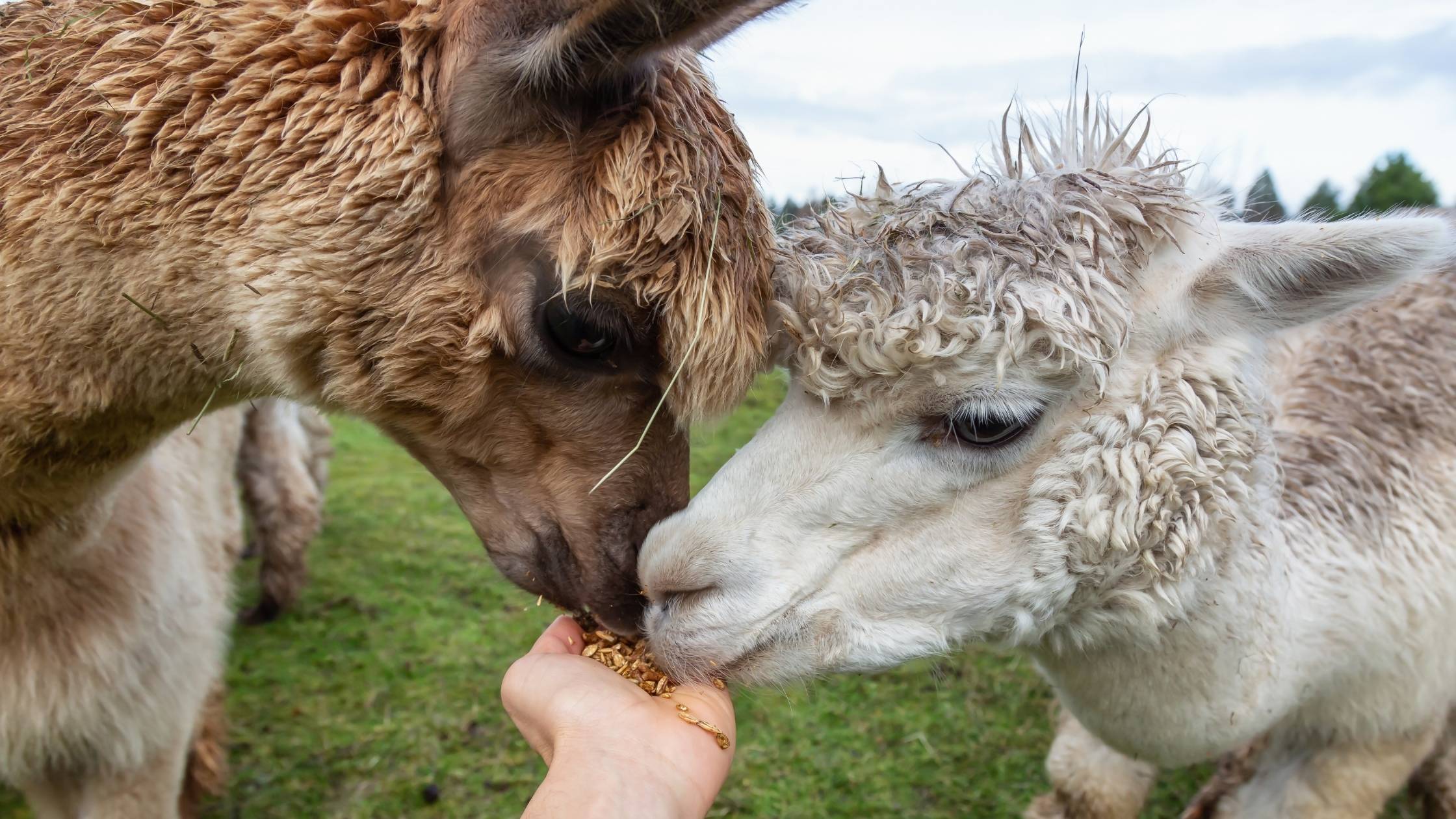Last Updated on 05/25/2021 by Veronica Jones
Alpacas are wonderful creatures that can make excellent farm animals. However, alpacas need to follow a particular diet to stay healthy and happy. They have sensitive bodies, so their owners have to be careful about what they feed them. So, what do alpacas eat? Here is a complete guide to help future alpaca owners learn about what they eat, how much they eat and more.
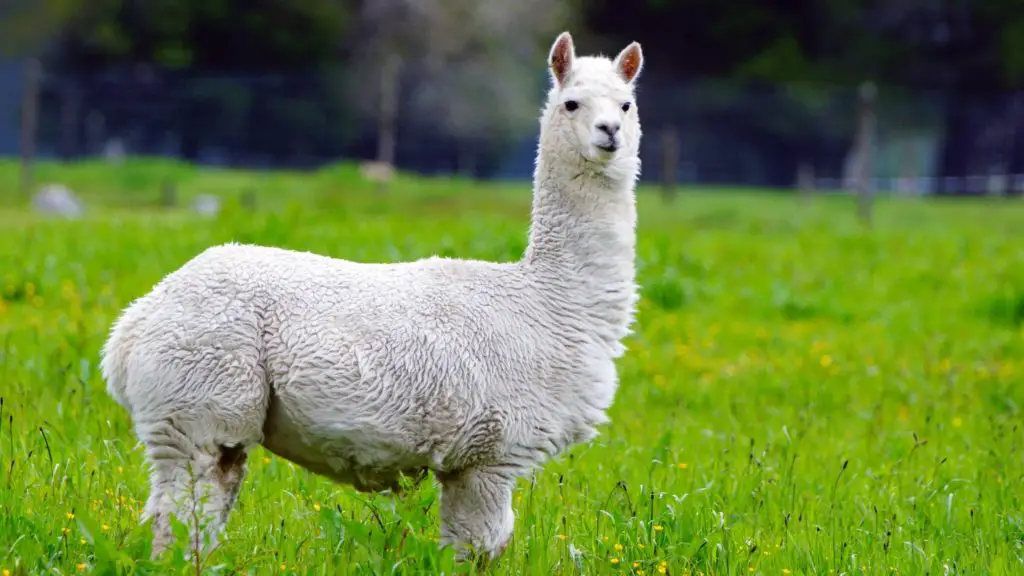
What Do Alpacas Eat?
Alpacas mostly eat grass, which compromises a huge part of their diets. They may also eat some roughage like bark and stems. They may also eat a bit of fruit and veggies. Some alpaca owners will feed their pets food pellets as a snack or health supplement.
What’s an Alpaca?
An alpaca is a domesticated type of ruminant that lives in the Andes, and people will not find alpacas in the wild. They are relatives of llamas, and many people raise alpacas because of their soft wool. Alpacas are smaller than their relatives, usually being about 3 feet tall.
Alpacas are herbivores, which means that they only eat plants. They will mostly graze on pasture, but they can eat other types of plants like fruits and veggies. They can also eat some stems, bark and wood for extra fiber. Wood, stems and fiber are ok for an alpaca because it has a three-chambered stomach that can properly digest roughage.
Grass for Alpacas
Pasture grass is a huge part of an alpaca’s diet. Alpaca owners should test their grass for mineral, protein and sugar content to help them learn how much they can eat, what supplements they may need, etc. Alpacas prefer young leaves and grasses because they are easier to digest and have more nutrients. Common grasses for alpacas include orchard grass, bahiagrass, Kentucky blue-grass, etc.
However, grass will not always be available, especially if a person owns a lot of alpacas because they will graze through it. Alpaca owners can offer pruned leaves and branches from alpaca-safe trees. They may also supplement their diets with hay to make up for the loss of grass.
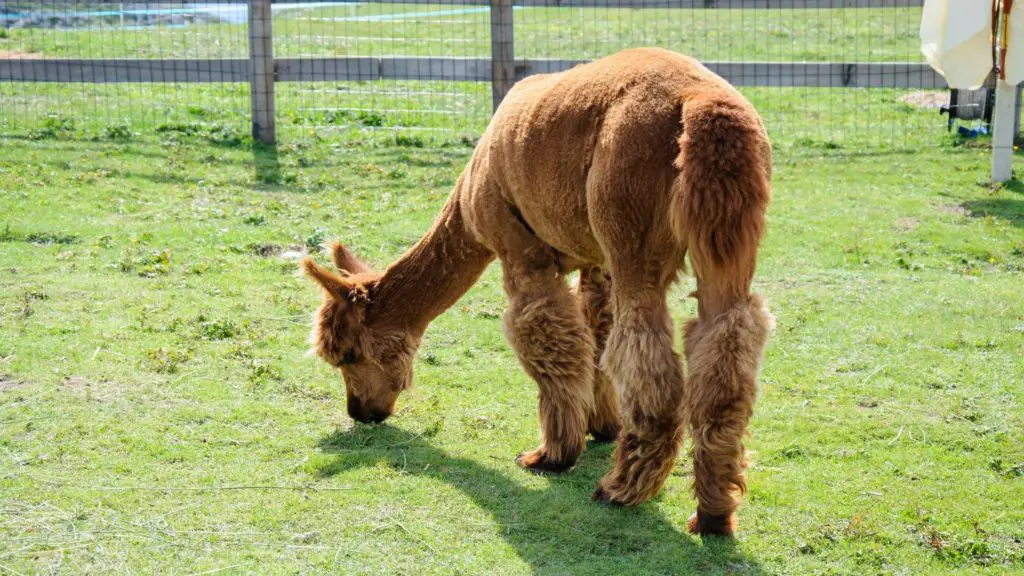
Hay for Alpacas
Grass hay is important for alpacas, especially during the winter when pasture will not grow. Hay will vary in nutrients per region, season, etc. Alpaca owners ought to test their hay to ensure that it contains the right nutrients for their alpacas. It should be 16% or less dry. It should have about 50% of digestible nutrients and about 9-14% of crude protein.
Do not give alpacas alfalfa. Alfalfa contains a lot of calcium and protein, which can easily be too much for most alpacas. Some people mix a small handful of alfalfa into safer hay if their alpacas need protein. Otherwise, other hay variants are better than alfalfa.
Can Alpacas Eat Weeds?
Alpacas can eat soft, tender weeds, meaning they can get rid of newer weeds. However, they may not go for drier and rougher weed bushes. Goats are better at eating mature weed and brush growth. Alpacas can maintain the pasture by getting rid of newer weeds. Of course, they should not eat poisonous weeds, like buttercups and milkweed.
Fruits for Alpacas
Alpacas can benefit from fruit because it contains a lot of important nutrients for them. Alpacas can have fruit 1-2 times a week, depending on their needs. Some examples of fruits that alpacas can eat are apples, watermelon, bananas, etc.
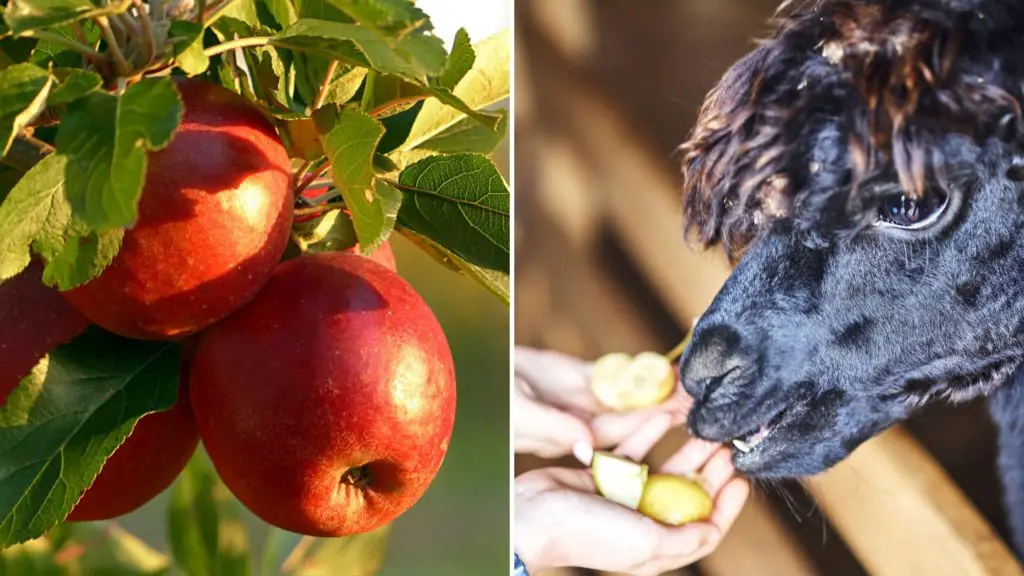
Veggies for Alpacas
Similar to fruits, veggies are a great addition to an alpaca’s diet. Alpacas can have veggies 1-2 times a week, depending on their needs. Some veggies that alpacas can snack on are carrots, celery, lettuce, cabbage, etc.
Can Alpacas Eat Grain?
Typically, alpacas should not eat grains.
Foods for alpacas that contain grain, like pellets or concentrates, ferment easily. The fermentation will create acid that can harm alpacas. The extra acid attacks microbes, harming the alpaca’s overall health.
Alpacas only need grains for specific situations. For instance, female alpacas that are late in their gestation period will need about 1% of their body weight in grain. Lactating alpacas and young alpacas will need about 2% of their body weight in grain.
There are acceptable grain-inclusive concentrates that can benefit alpacas when needed. Ideally, alpaca owners should not feed grains alone to their alpacas. There are mold-free, commercial mixes or specially mixed formulas for alpacas.
Can Alpacas Eat Wood or Bark?
Alpacas can eat bark or wood from trees. They may not actively look for it, as they may only try it when a branch falls. Some alpacas may like trees and bite off the bark from trees. They can eat the bark of certain trees, like pine trees and fruit trees. However, trees that are poisonous to alpacas, like oak, should be far away from them.
Do Alpacas Eat Food Pellets?
Food pellets for alpacas are not always necessary. If an alpaca has a well-balanced diet, mostly composed of hay and pasture, they do not always need food pellets. A veterinarian may only suggest food pellets if an alpaca lacks certain nutrients. Some alpaca owners give food pellets as a reward or treat for their alpacas.
What Can Alpacas Eat for Snacks?
Alpacas can have fruit and vegetables as snacks. They may also have food pellets as a treat. These are not a must for most alpacas, but having a slight variety in their diet can be a great boost for their health.
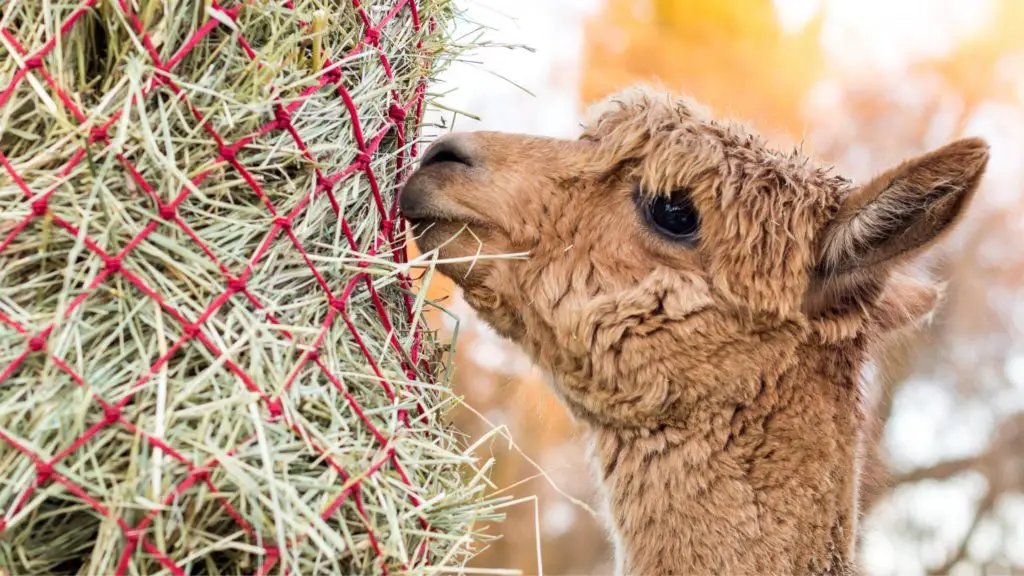
Do Alpacas Need Different Food During the Winter?
Alpacas often graze on a grassy pasture during warmer seasons, so they will likely need to eat more hay when it starts to snow. The average alpaca may eat up to half a bale of hay a week. It is important to keep their haymow full, so they have access to their food to make up for the lack of grass. Some pet owners may opt for concentrates.
What Is an Alpaca’s Favorite Food?
Most alpacas’ favorite food is apples and carrots. These are healthy and tasty treats for alpacas, and they will respond very well to them. However, these should still be treats because grass should compose most of their diet.
How Much Do Alpacas Eat?
An alpaca usually eats about 1.5% of its body weight a day for normal growth. An alpaca will get most of this food through silage, hay and protein. They may also eat some fruits and veggies to supplement the daily food intake.
Alpacas eat a lot less than other ruminants. It is likely because they are smaller, so they need less food. For instance, an alpaca that weighs 125 pounds may only need to eat 2 pounds of food a day.
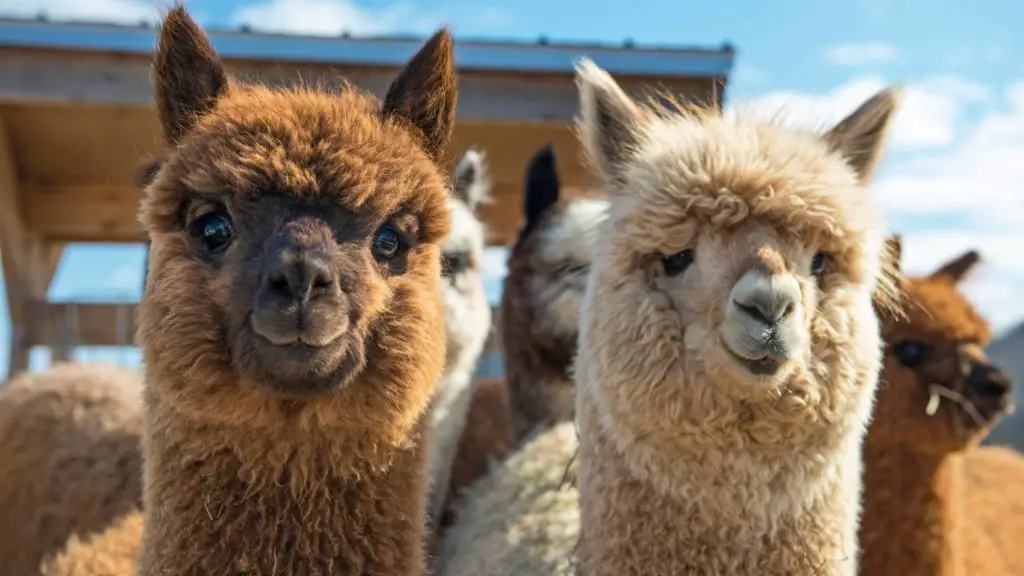
Foods Alpacas Should Not Eat
There are many dangerous fruits, veggies and other plants that people should never feed their alpacas. Some plants contain dangerous ingredients, like cyanide and sulfur. The following are foods that alpacas cannot eat:
Nightshade Plants (Eggplants, Potatoes and Tomatoes)
These plants contain alkaloids that can harm alpacas. Unripe tomatoes, stems and leaves are particularly poisonous to alpacas.
Beans (Peas and Lima Beans)
Two beans are poisonous to alpacas, which are peas and lima beans. They contain cyanide that is toxic. The beans themselves can contain low levels of cyanide, but the vines and leaves can be dangerous.
Onions
There is an alkaloid in onions that is a sulfur compound. It can lead to poisoning if the alpaca eats too much.
Mustard Family (Broccoli, Turnips, Kale, etc.)
The plants in the mustard family all carry a different risk for poisoning, so alpacas should avoid them entirely. They have glucosinolates, a compound that has sulfur that can harm red blood cells.
Daffodils, Daisies and Poppies
These plants are common flowers in gardens in America, but alpacas should not eat them. They all have a risk of poisoning when eaten. Therefore, they should not be within an alpaca’s reach.
Alpacas should always avoid foods and products for other animals that contain copper (even trace amounts). Alpacas only require very little copper in their diets, so foods meant for other animals that contain copper can be too much for them. Excess copper can lead to copper toxicity, and it is a progressive disease that can be fatal.
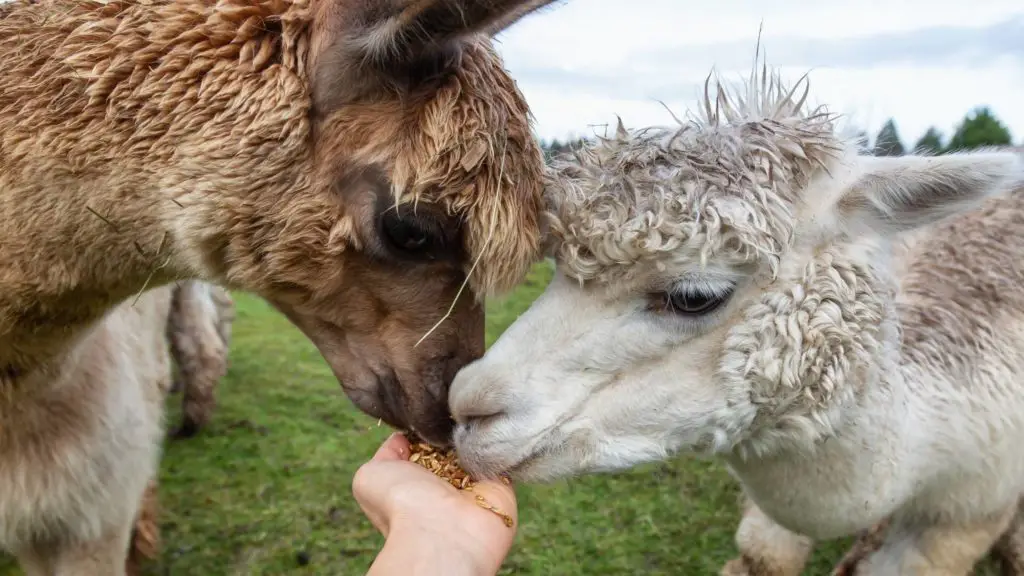
Do Alpacas Need Protein?
Yes, alpacas need protein. An adult alpaca’s diet should have about 10-12% protein, but the amount will change based on pregnancy status, life stage and activity levels. Luckily, their current diet contains enough protein for them.
Pasture grass and hay have protein, so most alpaca owners do not have to look for alternate sources of protein. However, people should watch out for how much sugar and protein the grass and hay contain. Legume hays like alfalfa have a lot of protein, so they may only eat a handful mixed into lower-protein hay.
Do Alpacas Need Salt?
Alpacas need salt because salt makes them thirsty, which will make them drink more water then eat more dry feed. However, they do not need salt blocks. Most alpacas prefer loose salt since they do not lick a lot. Alpacas should have access to salt, but their actual dry feed should not be too high in salt.
What Vitamins Do Alpacas Need?
Some of the main vitamins that alpacas need are vitamin A’s, B’s and E’s. One of the more important vitamins is vitamin D. Vitamin D helps absorb the minerals that alpacas need. Vitamin D will also prevent bone problems in alpacas, like rickets. It is ideal to speak to a veterinarian for the best sources of vitamins for alpacas and how to feed it to them, as each alpaca will have different needs.
How Much Water Do Alpacas Need?
Alpacas can drink as much as 2-3 gallons of water per day. The intake can increase depending on how active they are, the weather, etc. Water is crucial to ensure that their digestive systems work properly, so they need constant access to fresh and clean water. Alpaca owners ought to use water heaters in the winter to prevent the water from freezing. It will also encourage the alpacas to drink more water when the weather is cold.
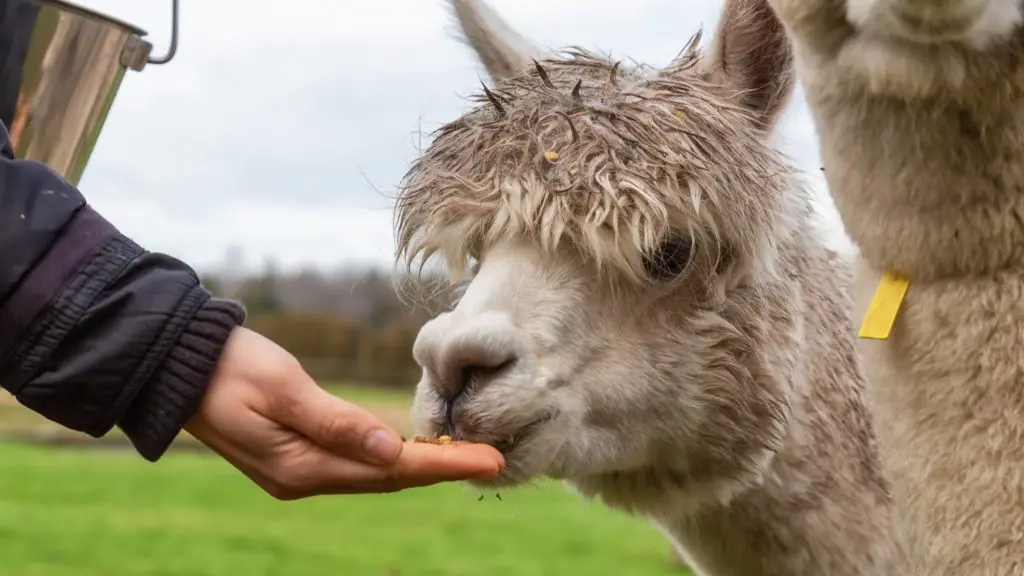
How to Feed an Alpaca
Alpacas will try to eat whatever greens they see. Therefore, they will likely graze on the grass, and even bushes, that are within their reach. Therefore, keeping certain grasses and bushes that they may not benefit from far from them would be ideal. Keep hay easily available to an alpaca in their eating areas, and the grass they walk on should be ok for alpacas.
Alpacas are prone to choking. Therefore, fruits and veggies need to get cut before serving them to alpacas. The pieces should be about bite-sized. That way, an alpaca can easily pick it up and chew it.
All in All
Alpacas need to mostly eat pasture grass and grass hay. They can also benefit from some fruits, veggies, loose salt, tree wood and concentrates to add more nutrition to their diets. However, pet owners should be wary of which ones are safe to give to alpacas by following the guide above.
References:
- Science Direct, ‘Ruminants – an overview’, https://www.sciencedirect.com/topics/agricultural-and-biological-sciences/ruminants, Date Accessed – 24 May, 2021
- North Western, ‘What’s an Herbivore?”. https://www.qrg.northwestern.edu/projects/marssim/simhtml/info/whats-a-herbivore.html, Date Accessed – 24 May, 2021
- Penn State University, ‘Poisonous Pasture Weeds’, https://extension.psu.edu/poisonous-pasture-weeds, Date Accessed – 24 May, 2021
- Lab Manager, ‘The Science of Fermentation’, https://www.labmanager.com/insights/the-science-of-fermentation-1432, Date Accessed – 24 May, 2021
- Providence, ‘Why legumes are the superheroes of the protein family’, https://www.providence.org/news/uf/629575667, Date Accessed – 24 May, 2021

